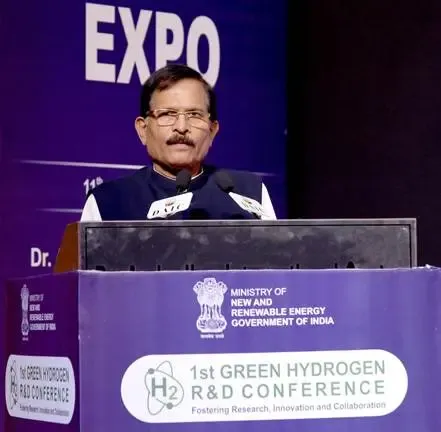Is India Becoming the Global Hub for Hydrogen Innovation?

Synopsis
Key Takeaways
- India is establishing itself as a global leader in hydrogen technology.
- Green hydrogen can decarbonize various industrial sectors.
- The National Green Hydrogen Mission aims to boost innovation and manufacturing.
- Over 200 R&D projects have been supported by the government.
- This initiative is crucial for achieving Net Zero by 2070.
New Delhi, Sep 12 (NationPress) Union Minister of State for New and Renewable Energy Shripad Yesso Naik announced on Friday that India is establishing robust foundations to transform into a global center for innovation, manufacturing, and deployment in hydrogen technologies. Speaking at the closing session of the inaugural Green Hydrogen R&D Conference in the capital, he emphasized that through the National Green Hydrogen Mission, initiated by Prime Minister Narendra Modi, India aims not only to be a consumer but also to take the lead in this essential clean energy sector.
“Central to this journey is green hydrogen, a fuel that has the potential to decarbonize our most challenging sectors, unlock new trade opportunities, and pave the way for a cleaner and more secure future,” he remarked.
“The National Green Hydrogen Mission, launched by the Prime Minister, is laying the groundwork for India to emerge as a global leader in innovation, manufacturing, and deployment of hydrogen technologies,” the Minister of State added.
Naik pointed out that green hydrogen is crucial for India’s goal of achieving Net Zero emissions by 2070.
He highlighted that this fuel can decarbonize challenging industries like steel, cement, fertilizers, shipping, and mobility, while also generating employment, decreasing import reliance, and enhancing the global competitiveness of Indian industries.
He noted that as nations implement carbon regulations, India's leadership in hydrogen will ensure its industries are prepared for the future.
The Minister mentioned that the government has already backed over 200 R&D projects in renewables, hydrogen, fuel cells, and storage technologies, with dedicated funding, testing facilities, and incubation programs aiding Indian researchers and startups in turning ideas into significant breakthroughs.
“This conference is a testament to our commitment to transform laboratories into launchpads and startups into global leaders,” he said, encouraging young researchers to create disruptive innovations rather than merely incremental improvements.
The two-day event, organized by the Ministry of New & Renewable Energy under the National Green Hydrogen Mission, attracted 1,347 participants and featured 17 technical sessions, five panel discussions, and eight roundtable meetings.
A startup exhibition showcased state-of-the-art hydrogen technologies developed within India.









